Arne Slot raised eyebrows with his decision to replace Jarell Quansah at half-time in his first competitive game, particularly when it became clear the centre-back was not injured.
But speaking after Liverpool’s 2-0 victory at Ipswich on Saturday, the head coach made a simple explanation for why he sent Ibrahima Konate on in his place.
“First thing I said was we don’t have to speak about tactics if we lose so many duels and that’s what we did,” he told TNT Sports of his message at the break.
“That’s not that Jarell lost every duel – many of us lost too many duels – but I think we needed Ibou Konate to win these long balls in the air from the No. 9.”
"The second half was a joy to watch"
Arne Slot reflects on his Liverpool side's first Premier League game of the season ?
?? @lynseyhipgrave1 | @petercrouch pic.twitter.com/2cb9WVk8yY
— Football on TNT Sports (@footballontnt) August 17, 2024
He went on to add: “I didn’t see them fighting for it in the first half. We lost almost every long ball, every duel, on both sides.
“In the second half they were ready and I think before scoring the goal we already had a very good chance. Then gaps opened up and you could also see we can play quite good football.”
Konate for Quansah
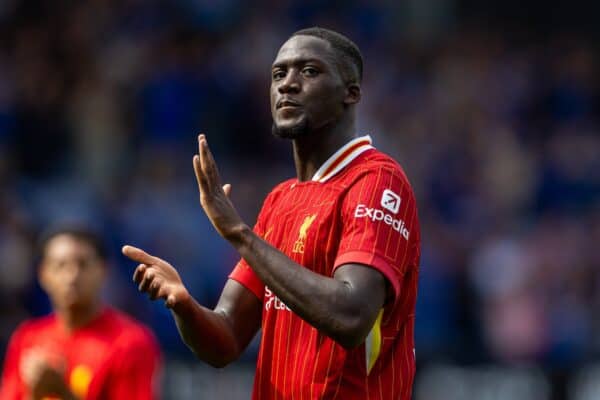
In terms of basic stats, per FotMob, Quansah won four of eight duels (50%) in his 45 minutes on the pitch, while Konate won four of five (80%).
The younger defender also gave away two fouls while his replacement conceded zero.
Bringing Konate into the fold clearly gave Liverpool more stability, but it would be reductive to suggest it was simply a like-for-like change that improved their game.
Firstly, Slot himself noted that Ipswich “put so much energy into the first half” that there was an inevitable drop-off from a side with little experience of Premier League football.
“They had to keep on running, keep on fighting, they were playing all over the pitch one-vs-one,” he explained, “and I don’t think they could keep up with that tempo in the second half.”
There was always an expectation that a team with Liverpool’s quality and knowhow would eventually gain control of the tie, and going in at half-time without conceding was a big step towards doing so – which Quansah undoubtedly played a part in.
But the introduction of Konate certainly allowed that to happen, with Slot taking a cue from Jurgen Klopp‘s setup from last season.
“There weren’t huge differences tactically in the second half,” Ipswich manager Kieran McKenna insisted in his post-match press conference.
“Trent played a little bit higher on the right-hand side so there were a few little adjustments.”
How Trent changed the game
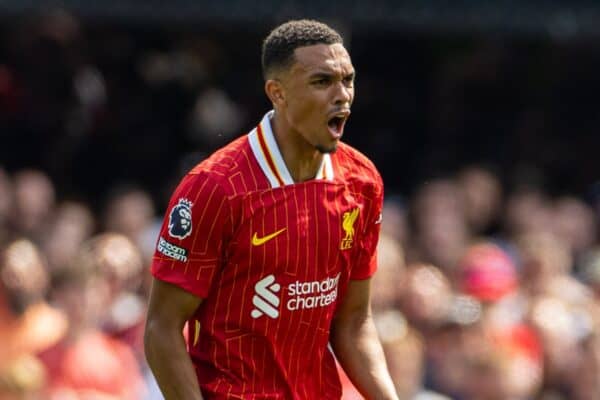
Konate’s speed in recovery and ability to dominate over large areas of the pitch were crucial in establishing Trent Alexander-Arnold in his role as inverted right-back last term, providing the stability for him to move into midfield.
While Slot has restored the vice-captain to more of an out-and-out full-back, he showed in the second half against Ipswich that he is willing to be flexible.
With the Frenchman giving more assurance on the right-hand side, Alexander-Arnold was able to push forward more, and often into midfield areas, freeing him up to play killer passes.
The No. 66’s touch maps in the first and second halves of Saturday’s win – via WhoScored – show how his role changed:

While the majority of Alexander-Arnold’s touches in the first half at Portman Road were in his own half and on the right touchline, there was more variation after the break – and less involvement in defensive areas.
He played a key role in setting up Slot’s favourite chance of the game, playing a one-two with Dominik Szoboszlai in the centre circle before driving forward, trading passes with Diogo Jota and touching the ball into the path of Luis Diaz.
TAA in #IPSLIV ? pic.twitter.com/ZCVqwxGCL8
— Liverpool FC (@LFC) August 19, 2024
Diaz was unable to convert one of Liverpool’s six big chances in the second half, but the head coach told his post-match press conference: “That was the way I want to see the team doing more and more and more and more if they can.”
Another big chance came from a more traditional route, Alexander-Arnold crossing from wide right and Jota heading just wide of the post.
Then a stunning through ball from just inside the Ipswich half sent Mohamed Salah behind and, without even needing to take a touch, the Egyptian was able to play it across for Jota to tap in and make it 1-0.
Alexander-Arnold came off for Conor Bradley after Salah put Liverpool 2-0 up, and the Northern Irishman was similarly advanced as his WhoScored touch map shows:
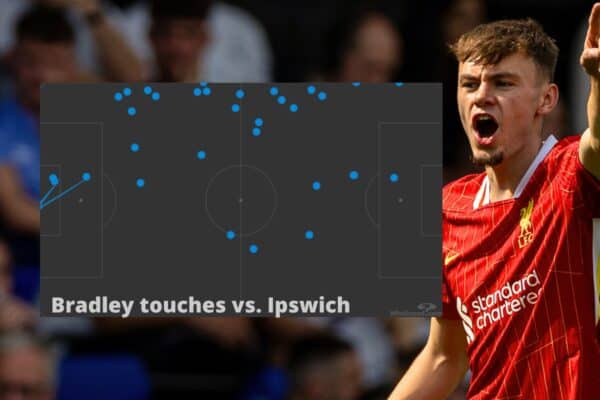
Bradley was on the pitch for just over 20 minutes including added time but was involved in three moves in Ipswich‘s box, including two shots on goal and one big chance missed.
By that point Liverpool were on a roll, suffocating their opposition, and that was largely down to Slot’s bold half-time switch.
Slot’s first big call pays off
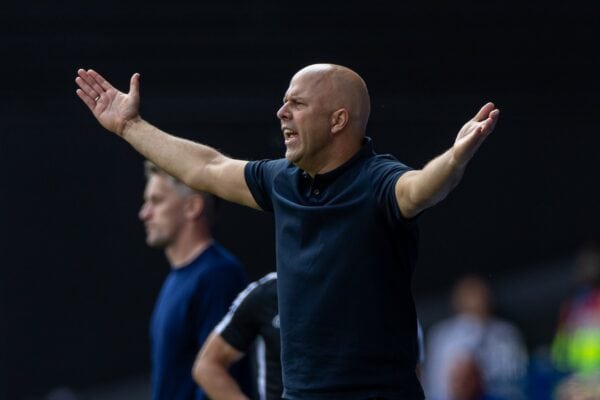
Much has been made of Quansah’s reaction to Jota’s opener, the 21-year-old staying seated while Liverpool’s substitutes and staff celebrated around him, and that can be one of the downsides to these cutthroat decisions.
But with daily meetings held with both the squad and individuals, it will no doubt be made clear to Quansah this week exactly why the change was made and why it won’t affect his standing.
Speaking before the game, Slot had described the choice between Quansah and Konate as a “close call,” and the battle for a spot alongside Van Dijk should be a healthy one.
It is widely accepted that consistency is key to a solid defence, but Slot has already shown that he is not averse to making cold, calculated decisions to address tactical flaws in-game – and against Ipswich, it paid off.
That was about more than simply winning duels; it was about gaining control and allowing Alexander-Arnold to operate further forward, which changed the game in Liverpool’s favour.
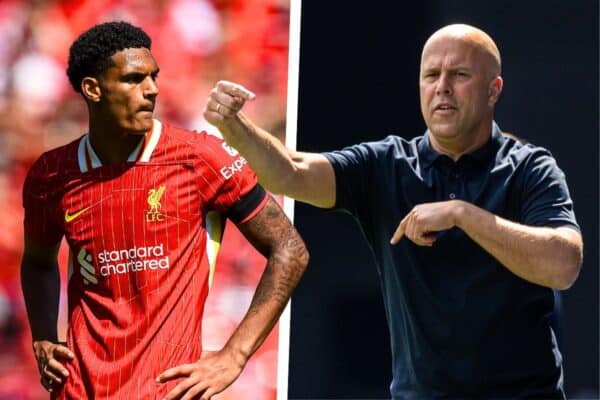




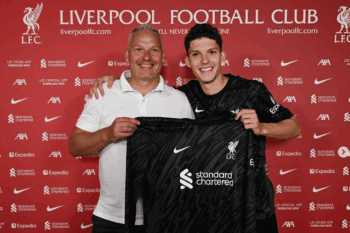











Fan Comments